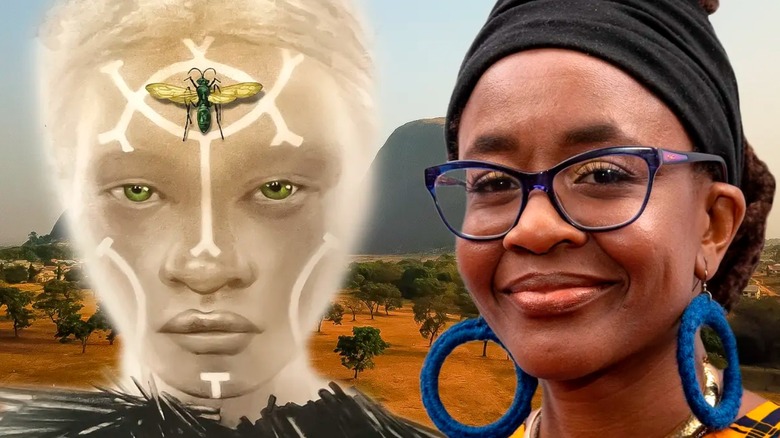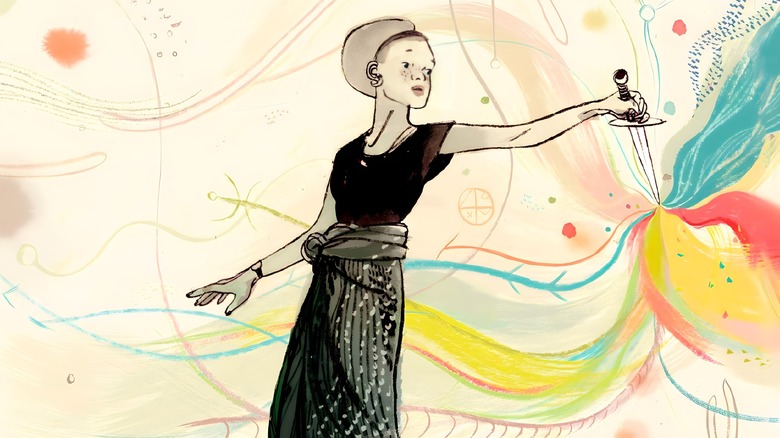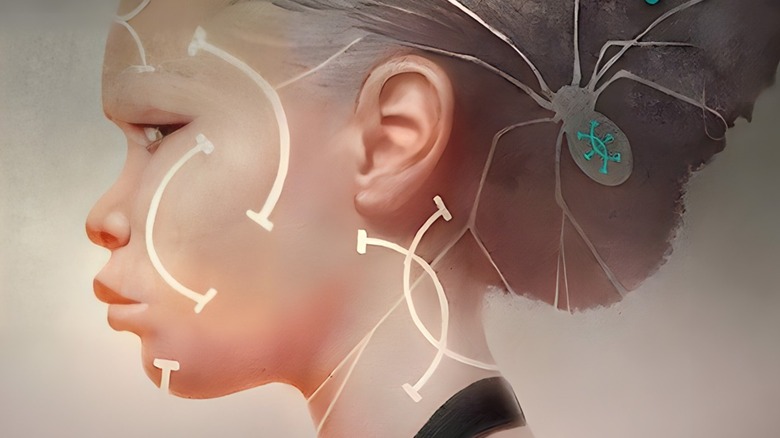Nnedi Okorafor's Akata Witch Books Are The Next Great Fantasy Series That Should Be On Hollywood's Radar
If you're not yet familiar with the Nebula, World Fantasy, and two-time Hugo Award-winning author Nnedi Okorafor, you soon will be.
In 2020, The Hollywood Reporter announced that Michael Ellenberg's Media Res would bring the author's critically-acclaimed "Binti" trilogy to the small screen for Hulu, with a script co-written by Okorafor and the Emmy-nominated Stacy Osei-Kuffour (of "Watchmen"). Meanwhile, over on HBO, another award-winning writer, George R.R. Martin, is in the process of developing Okorafor's renowned novel, "Who Fears Death." What's more, Martin is far from the only big name attached to the project: Marvel alum Tessa Thompson will serve as an executive producer, while Aïda Mashaka Croal (of "Jessica Jones" and "Luke Cage") is signed on as showrunner.
Though release dates have yet to be announced, it's safe to say the next few years will introduce an even wider audience on to the work of Okorafor, whose genre-bending stories consistently defy strict categorization, with works ranging from her 2019 memoir to the Hugo Award-nominated comic book "Black Panther: Long Live the King." Yet while Hollywood is clearly, and rightfully, aware of Okorafor's diverse catalog of groundbreaking work, they've yet to scoop up her "Nsibidi Scripts Series" — comprised, for now, of 2011's "Akata Witch," 2017's "Akata Warrior," and 2022's "Akata Woman" — a narrative whose themes have only grown in relevance, urgency, and necessity with each passing year.
It's not just the relevance of the "Nsibidi Scripts Series" that makes them ripe for mainstream adaptation, however. Each book does something only the rarest of stories manage to fully achieve — but that any work of art must, by definition, aspire to achieve. That is, they leave their reader forever changed.
What is the Nsibidi Scripts Series?
Before we dive into why Hollwood should turn its attention to the "Nsibidi Scripts Series," it must be said that the paramount motive for adapting the YA narrative is, simply, that it's just damn good storytelling.
In "Akata Witch," we meet the tale's central protagonist, Sunny Nwazue, and accompany her on a bewildering, empowering, dangerous, frightening, and fulfilling journey of self-discovery. Immediately, we learn that Sunny's background and appearance confuses her peers. As Sunny tells us, "I'm Nigerian by blood, American by birth, and Nigerian again because I live here. I have West African features, like my mother, but while the rest of my family is dark brown [...] I'm albino."
It isn't just Sunny's appearance and dual cultural identity that makes her an outcast: there are other seeming contradictions. She's an athletic and extremely intelligent young girl in a world that frequently discourages or underestimates both her brain and her brawn; she's a Leopard Person living in a world of Lambs (more on that in a moment); and, as a "free agent" (that is, a Leopard with Lamb parents), she's a rarity twice over.
As in all of Okorafor's work, Leopard People resist a simple, straightforward explanation. They possess secret knowledge and skills, including the ability to engage with, manipulate, and combat juju. They can access places, concepts, and whole worlds that Lambs (the non-mystically gifted) cannot, and while the term for such magical individuals differs across the world, the notion of "Leopard Person" is specifically West African. With the help of mentors and her newfound friends — the bold and defiant Chichi, the mysterious, impulsive (and like Sunny, Nigerian-American) Sasha, and the sensible Orlu — Sunny discovers what it means to be a Leopard, and she faces off against forces with apocalyptic intent.
Akata Witch is far more than the Nigerian Harry Potter
Amazon's "Akata Witch" description labels it "The Nigerian Harry Potter," an association both inaccurate and inadequate. In a Tin House interview, Okorafor addressed this: "I understand the inclination to think like that, but that way of thinking will prevent you from ever really seeing beyond what you're familiar with."
Frustrated by the reductive effect the correlation was having on the understanding of her work, Okorafor stressed she was writing in an entirely different genre from J.K. Rowling by giving that genre a name: Africanjujuism, telling Publishers Weekly, "I felt that a lot of my work, including the 'Nsibidi Script series,' was being read through a Western lens. People [...] weren't understanding that a lot of the mystical things happening in these books were real [mythology]."
West African culture is embedded deeply into the "Akata Witch" books, which pull from actual cosmologies and traditions — e.g., masquerades, secret societies, and deities like Ekwensu, Ogbuide, and Udide — of also real peoples such as the Igbo, the Efik, and, yes, the Leopard People. While Okorafor's universe grows increasingly fantastical, the realness of its Nigerian setting is significant. Both the serious and playful aspects are based on real-world Nigerian traditions (see: pepper soup vs juju-infused, tainted pepper soup). To suggest that juju is simply "the 'African' term" for magic, or Leopard People "the 'African' term" for wizards and witches, suggests all fairytales are about tiny blonde winged women with an odd dependence on a guy named Peter. And if a story has nothing new to teach us, what's the point?
We're emphasizing this, because what Okorafor intentionally refuses to do in the novels is — with regard to its need for an adaptation — almost as important as what she triumphantly succeeds at.
Akata Witch's narrative trusts you to learn, experience, and grow
To fully appreciate the "Nsibidi Script Series," a Western reader — or, if an adaptation ever happens, future viewer — must get comfortable admitting and even embracing how little they know. From "Akata Witch" onwards, you'll stumble across words you've never seen and can't immediately pronounce, concepts you might struggle to understand, traditions you've never heard of, as well as flora, fauna, and terrain that you'll have to look up in order to know whether or not it's real.
What makes this even more exciting is that Okorafor does something all-too-rare in mainstream storytelling: she trusts you. She expects you to manage it all, and to grow and learn along with her protagonist the entire time. When she plays with stereotypes, Okorafor trusts you to get it. When she introduces a concept, like Leopard People having a human face and a spirit face (their mystical identity, which is not of this world) she makes no attempt to squeeze it into Western terminology. And when things like sexism, bigotry, corruption, or senseless murder occur, they occur as they do in the real world.
Okorafor saves the vast majority of her metaphors for the intangible and ideological. She doesn't couch things many of her readers confront on a daily basis in tried-and-true YA tropes like ghouls or monsters. The books' very titles, in fact, trust you to embrace an uncomfortable reckoning. As she explained on The New Yorker's radio hour, "[Akata is] a derogatory term for Black Americans, but that also includes Nigerian Americans as well. This is a word that I have grown up hearing and being called and grappling with and yelling about."
Nnedi Okorafor's work defies any efforts to simplify it
In The Los Angeles' Review's report on "Akata Woman," reviewer Deborah Williams writes, "Okorafor's trilogy — and this third book in particular — wants to teach us how to read: how to read outside of an Anglo European context."
Crucially, the mystical object at the heart of "Akata Woman" isn't a grail, sword, or diary, but a ghazal, and as Williams points out, Sunny's education in Nsibidi script is in direct conversation with both the 7th century form of Arabic verse, and the author's work as a whole. Indeed, as Okorafor has explained (via Brittle Paper), "Nsibidi is a secret and often mystical ideographic writing system created in what is now called southeastern Nigeria [...] It is truly deeply only West African."
Sunny's Nsibidi journey in Book 3 of the series is, as Williams writes, "A version of what happens when we read a ghazal [...] Ghazals are written in couplets, each of which ends with the same word or phrase. Depending on the context of the specific couplet, the repeating phrase shifts in meaning — we must learn to hold all these meanings in mind, simultaneously, as we read." And so, a Nsibidi book (as depicted in the "Akata Witch" novels) is constantly shifting in meaning, even shifting from one genre to the next — like Okorafor's own writing, which can be anything from fantasy, to horror, to speculative fiction, to Africanfuturism, to Africanjujuism, to all of these things at once.
Sunny must hold all those meanings — as well as all her various identities — in mind, simultaneously, in order to fully realize herself and embrace her power. And Okorafor's books aren't just teaching us the value of knowledge. She's training us to comprehend multiple — and conflicting — concepts, meanings, and worldviews simultaneously.
Sunny's story deserves the widespread attention an adaptation would give it
This is why "Akata Witch" and its sequels deserve the attention a mainstream TV or movie adaptation would bring: these books have a lot to give. Because despite the myopic nature of the internet, with its echo chambers and constant lines drawn in the sand, the world itself is a vast, complex, conflicting and conflicted place. There aren't singular "right" answers. There are complex, conflicting and conflicted ideologies, worldviews, and people. Most of us will only ever understand the tiniest sliver of it.
Among the many things Sunny teaches us (by learning them herself) in the series, the following lessons are deeply relevant: There are no zero-sum games. No group is a monolith. No identity is whole, singular, and easy to define. But when we refuse to accept that nuance and complexity, we'll suffer (as so many Lambs do) due our own willful ignorance.
Unfortunately, over the past several years (and particularly, though not exclusively, in the United States) that ignorance has only grown in its willfulness, as groups across the country conspire to pass it on to the next generation. Halfway through 2023, nearly 900 books have been banned in U.S. schools. As PEN America reports, such bans are intently aimed at books featuring discussions of racism, LBTQ+ characters, and LGBTQ+ themes. Meanwhile, politicians — with the support of fearful parents, in the guise of preserving "America" — are making it illegal to teach any reality that might conflict with what (white) children already "know."
In contrast, in "Akata Warrior," it's no accident that Sunny — in order to defeat a djinn, and redeem and free the trapped Ogwu, a descendant of Udide, and her many spider children — must "remember" a tragic, violent event that happened long before her birth.
The Akata Witch books elevate knowledge and learning as a (literal) currency
This sequence in "Akata Warrior" is a tense and terrifying moment for Sunny, and after her triumph over the djinn, and her memory of her ancestral and spirit past, it's written that, "Her muscles felt sore and her head ached. But she felt good. She felt strong. The memory of Ogwu's failure and curse was vivid in her head." Ogwu was part of a team, Sunny "remembers," who failed to stop the Enola Gay from dropping the bomb on Hiroshima.
Sunny's confrontation with the djinn is not the first time, and it won't be the last, that she must past through uncertainty, confusion, fear, and pain in order to gain knowledge. Okorafor's "Nsibidi Scripts Series" is overflowing with valuable lessons for young people (and adults) from all walks of life who happen to be living in this day and age. For instance: for Leopard People, what Lamb society sees as their flaws are in fact the very source of the power. For example, the dyslexic Orlu can undo juju, while Sunny's albinism allows her to "glide" freely between our world and the wilderness — that is, the spirit world, which exists all around us, but that only Leopard People can access, and only someone like Sunny can move through without temporarily dying.
And there are, of course, lessons about friendship, sacrifice, teamwork, self-discovery and self-acceptance, as well as a strong commentary on war, capitalism, and the destruction of the natural world. But it's the series' emphasis on learning, and on knowledge and wisdom as the most valuable possession in the world — the only way to obtain currency in the Leopard world is by learning something new — that makes its adaptation not only desirable, but downright urgent.
A Nsibidi Scripts adaptation is exactly what we need right now
Early on in "Akata Warrior," Sunny — who's been traumatically separated from her spirit face, Anyanwu — enters the fearsome Nimm Village on a quest for the ghazal. There, she must speak to Chichi's estranged auntie, aka Abeng Nimm, aka She Who Lives in a Tree. Okorafor's writing, here, elevates the central theme of these books:
"[Sunny] was almost there, and she had just one moment to process two things [...] She smashed through the huge tungwa and glided right into the tree. [...] She could feel the tree's flesh biting and pulling at her as she passed through it as nothing but spirit. She kept going. She didn't know how long she burrowed, and more than once the fear of getting stuck inside the solid flesh of a tree crossed her mind [...] When she tumbled onto the smooth surface of the tree's wooden floor, she was Anyanwu and Anyanwu was her. They moved together and they felt confident in their motion. The rays of sunshine that glowed from her spirit face lit the entire room."
Anyanwu isn't just a clever name Okorafor gave to Sunny's spirit face. In Igbo, it means "eye of the sun," but Anyanwu is also recognized as a solar deity, and a manifestation of the supreme creator, Chukwu. The truth can hurt, and the process of learning can indeed be uncomfortable — even painful. But it is, as both the candle-loving Sunny and the reader learn early in Book 1, the only way out of the dark. And at a time when so many are determined to keep themselves and their children in that darkness, an adaptation of Sunny's journey would serve as a powerful and necessary light source.







